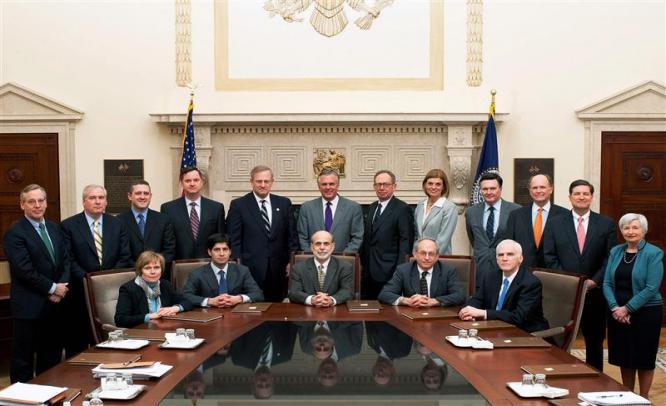Ahead of a crucial Fed meeting, data shows there is no let up in ongoing US economic recovery, reports Team IFM
New York, January 29:There are no significant signs of a let up in the ongoing US recovery, analysts and economists said on Tuesday, a day ahead of a crucial meeting of the Fed’s FOMC, following release of data that showed that consumer expectations were rising and home prices were still buoyant although new orders for consumer durables showed a decline in December.
The consumer confidence index of The Conference Board, a New York-based economy tracker, showed expectations of American consumers kept climbing in January after registering a sharp improvement the month before.
Separately, the Standard & Poor’s/Case-Shiller home price indices, a trusted measure of the US housing sector, said rates in November notched a year-on-year increase despite a fall when compared to October – indicating home owners were enjoying appreciation and rising equity values. In a media statement, David Blitzer, Chairman of the Index committee at S&P Dow Jones Indices, said “housing will make further contributions to the economy in 2014”.
The bad news on Tuesday was, however, a US Commerce Department report that said new orders for manufactured durable goods – from toasters to aircraft or anything expected to last three years and more – decreased 4.3 per cent ($10.3 billion) in December from the month before. Analysts say depressed demand for such goods is a sign of caution among businesses.
Ben Bernanke is scheduled to hold his last meeting as chairman of the US Federal Reserve Bank and its Federal Open Market Committee (FOMC) on Wednesday. Analysts expect the latest data will have some impact on how the FOMC votes on issues such as interest rates and “tapering” of Quantitative Easing. Investors are eagerly awaiting the FOMC statement to be released on Wednesday.
Economic Outlook:
The reading for consumer confidence was the best since August and reflected rising optimism among households about the labour market and business conditions.
The Conference Board, a non-profit business research group organization that publishes several widely tracked economic indicators, said those expecting business conditions to improve over the next six months remained unchanged, while those anticipating it to worsen decreased.
“Consumer confidence advanced in January for the second consecutive month,” said Lynn Franco, Director of Economic Indicators at The Conference Board. “Consumers’ assessment of the present situation continues to improve, with both business conditions and the job market rated more favourably.”
In a media statement, the Board said consumers’ outlook for the labour market was mixed. The number of people expecting more jobs in the months ahead declined. At the same time, however, those anticipating fewer jobs also decreased.
Alongside, the proportion of consumers expecting their incomes to increase rose by two percentage points, while those anticipating a decrease in their incomes declined by one. “All in all,” said Franco, “confidence appears to be back on track and rising expectations suggest the economy may pick up some momentum in the months ahead.”
Franco’s analysis was echoed by Chris Rupkey, Chief Financial Economist at Bank of Tokyo-Mitsubishi UFJ in New York. “This isn’t news that says the economy has lost upward momentum,” Reuters quoted Rupkey as saying. “It is steady as she goes for the economy.”
US Home Prices:
November was a “good month” for home owners, according to Blitzer of S&P Dow Jones Indices. “Despite the slight decline, the 10-City and 20-City Composites showed their best November performance since 2005. Prices typically weaken as we move closer to the winter,” Blitzer said in a statement.
The analyst noted that home prices continue to rise despite last May’s jump in mortgage interest rates. “Mortgage applications for purchase were up in recent weeks confirming home builders’ optimism,” he said. “Combined with low inflation, home owners are enjoying real appreciation and rising equity values.”
Blitzer however cautioned that while housing will make further contributions to the economy in 2014, the pace of price gains is likely to slow during the year.
Other analysts too pointed to the tardy improvement in the housing market in recent months, an indication that the market will likely expand more gradually this year. Ironically, it’s the rising home prices – which Blitzer says will contribute to the economy – that has led to reduced affordability, compounded by rising mortgage rates, these analysts say.
“Sellers used to seeing huge price gains month after month may feel some whiplash as that slows down,” Associated Press quoted Stan Humphries, Chief Economist at real estate firm Zillow, as saying.
“The housing market is still a long way from normal, but it’s getting there,” Zillow said.
In a statement on January 23, the National Association of Realtors of the US said sales totalled 5.09 million for all of 2013, “the best performance since 2006”.
Said NAR Chief Economist Lawrence Yun: “We lost some momentum toward the end of 2013 from disappointing job growth and limited inventory, but we ended with a year that was close to normal given the size of our population.”
Consumer Durables:
Casting a shadow on an otherwise bright economic outlook was a US government report on Tuesday that said orders for long-lasting manufactured goods fell in December after registering an upward trend the previous month.
The report said new orders for manufactured durable goods in December decreased $10.3 billion or 4.3 percent to $229.3 billion. The decrease, down two of the last three months, followed a 2.6 per cent November increase.
The decline was led by non-defence aircraft and parts, which decreased $3.8 billion, the repost added. In a domino effect, shipments of manufactured durable goods also dipped following four consecutive monthly increases by 1.9 per cent or $4.5 billion.
As a direct fallout of this, inventory piled up by $3 billion, the report added. Incidentally, economists polled by Reuters had expected orders for durable goods to rise 1.8 per cent in December on the back of a 3.4 per cent advance in November.

